Hyundai Kona vs Suzuki Swace – Differences & prices compared
Compare performance, boot space, consumption and price in one view.
Find out now: which car is the better choice for you – Hyundai Kona or Suzuki Swace?
The Hyundai Kona (SUV) comes with a Petrol, Full Hybrid or Electric engine and Manuel or Automatic transmission. In comparison, the Suzuki Swace (Estate) features a Full Hybrid engine with Automatic transmission.
When it comes to boot capacity, the Hyundai Kona offers 466 L, while the Suzuki Swace provides 596 L – depending on how much space you need. If you’re looking for more power, decide whether the 218 HP of the Hyundai Kona or the 140 HP of the Suzuki Swace suits your needs better.
In terms of consumption, the values are 14.60 kWh4.50 L per 100 km for the Hyundai Kona, and 4.50 L for the Suzuki Swace.
Price-wise, the Hyundai Kona starts at 23100 £, while the Suzuki Swace is available from 31900 £. Compare all the details and find out which model fits your lifestyle best!
Hyundai Kona
The Hyundai Kona blends a bold design with a versatile interior, making it a standout choice in the compact SUV market. Its crisp handling and responsive steering provide an engaging driving experience, whether in the city or on the open road. The vehicle also offers a range of features designed to enhance comfort and connectivity, ensuring a pleasurable journey for both driver and passengers.
details @ hyundai.news
@ hyundai.news
 @ hyundai.news
@ hyundai.news
 @ hyundai.news
@ hyundai.news
 @ hyundai.news
@ hyundai.news
Suzuki Swace
The Suzuki Swace presents itself as a stylish hybrid estate car, combining practicality with eco-friendly credentials. Its sleek design is complemented by a comfortable and spacious interior, ideal for families and long journeys. The Swace's impressive fuel efficiency and advanced safety features make it a standout choice for those looking to merge economy with everyday usability.
details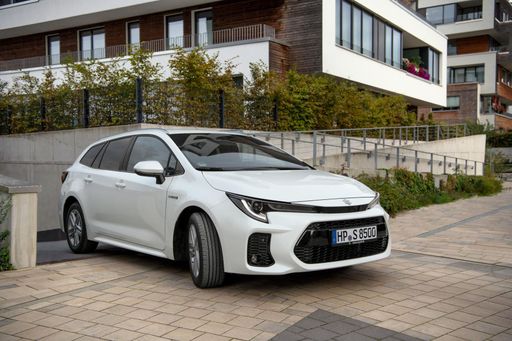 @ Suzuki
@ Suzuki
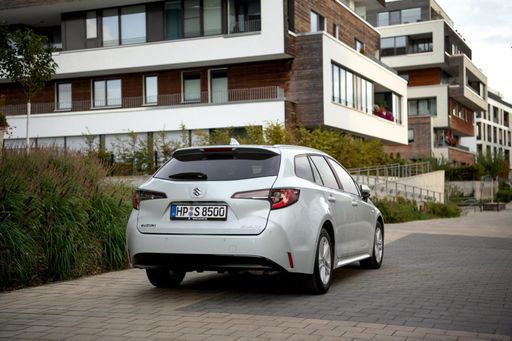 @ Suzuki
@ Suzuki
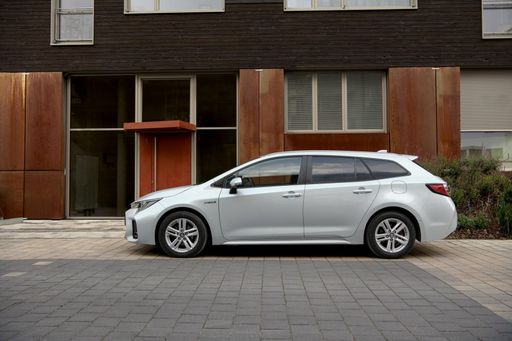 @ Suzuki
@ Suzuki
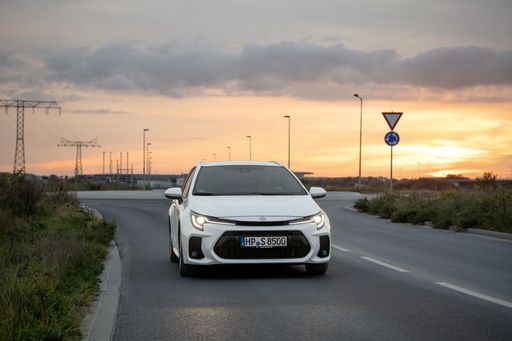 @ Suzuki
@ Suzuki
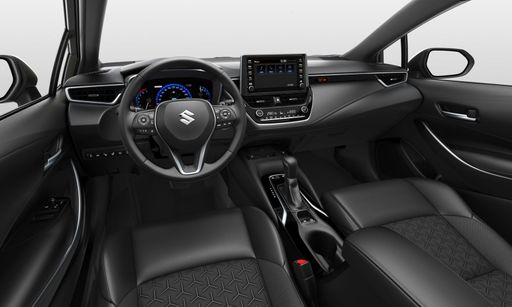 @ Suzuki
@ Suzuki

|

|
|
|
|
Costs and Consumption |
|
|---|---|
|
Price
23100 - 41600 £
|
Price
31900 £
|
|
Consumption L/100km
4.5 - 6.9 L
|
Consumption L/100km
4.50 L
|
|
Consumption kWh/100km
14.6 - 16.8 kWh
|
Consumption kWh/100km
-
|
|
Electric Range
377 - 514 km
|
Electric Range
-
|
|
Battery Capacity
1.3 - 65.4 kWh
|
Battery Capacity
-
|
|
co2
0 - 157 g/km
|
co2
102 g/km
|
|
Fuel tank capacity
38 - 47 L
|
Fuel tank capacity
43 L
|
Dimensions and Body |
|
|---|---|
|
Body Type
SUV
|
Body Type
Estate
|
|
Seats
5
|
Seats
5
|
|
Doors
5
|
Doors
5
|
|
Curb weight
1370 - 1773 kg
|
Curb weight
1475 kg
|
|
Trunk capacity
466 L
|
Trunk capacity
596 L
|
|
Length
4350 - 4385 mm
|
Length
4655 mm
|
|
Width
1825 mm
|
Width
1790 mm
|
|
Height
1580 - 1585 mm
|
Height
1460 mm
|
|
Payload
420 - 490 kg
|
Payload
360 kg
|
Engine and Performance |
|
|---|---|
|
Engine Type
Petrol, Full Hybrid, Electric
|
Engine Type
Full Hybrid
|
|
Transmission
Manuel, Automatic
|
Transmission
Automatic
|
|
Transmission Detail
Manual Gearbox, Dual-Clutch Automatic
|
Transmission Detail
-
|
|
Drive Type
Front-Wheel Drive, All-Wheel Drive
|
Drive Type
Front-Wheel Drive
|
|
Power HP
100 - 218 HP
|
Power HP
140 HP
|
|
Acceleration 0-100km/h
7.8 - 13.3 s
|
Acceleration 0-100km/h
9.40 s
|
|
Max Speed
162 - 208 km/h
|
Max Speed
180 km/h
|
|
Torque
200 - 265 Nm
|
Torque
-
|
|
Number of Cylinders
3 - 4
|
Number of Cylinders
4
|
|
Power kW
74 - 160 kW
|
Power kW
103 kW
|
|
Engine capacity
998 - 1598 cm3
|
Engine capacity
1798 cm3
|
General |
|
|---|---|
|
Model Year
2024
|
Model Year
2024
|
|
CO2 Efficiency Class
D, C, E, F, A
|
CO2 Efficiency Class
C
|
|
Brand
Hyundai
|
Brand
Suzuki
|
Hyundai Kona
The Hyundai Kona: A Comprehensive Overview
The Hyundai Kona has established itself as a standout in the compact SUV segment, blending innovation with performance and style. As the automotive world moves towards more sustainable and efficient options, the Kona offers a variety of powertrains, from traditional petrol engines to full hybrids and all-electric models.
Powertrain Options and Performance
The Hyundai Kona's powertrain choices cater to a wide range of preferences. For petrol enthusiasts, the Kona offers a 1.0L T-GDI engine, delivering 100 PS, and a more robust 1.6L T-GDI variant with up to 170 PS. Those looking for efficiency without sacrificing power can consider the full hybrid model, offering 129 PS and an impressive consumption of 4.5 L/100km.
For a greener option, the all-electric Kona provides a compelling case. With battery capacities of up to 65.4 kWh, the electric Kona offers power outputs of 156 to 218 PS, and efficiencies as low as 14.6 kWh/100km, enabling an electric range of up to 513 km.
Technical Specifications and Innovations
Built on a robust platform, the Kona delivers versatility and reliability. With a choice between manual or dual-clutch automatic gearboxes, along with options for front-wheel or all-wheel drive, the Kona ensures a tailored driving experience. The handling is enhanced by the car's lightweight construction, balancing a 1370 to 1773 kg curb weight with dynamic performance.
The Kona's design doesn't compromise cargo space for style; it offers a generous 466 L boot capacity. With a relatively compact body, measuring 4350 to 4385 mm in length, the Kona easily navigates urban environments while still commanding a strong road presence with its 1825 mm width.
Efficiency and Eco-Friendliness
Hyundai is committed to reducing emissions, as evidenced by the Kona's CO2 efficiency ratings, which range from class A for electric models to class D for some higher-performance petrol variants. The focus on reducing environmental impact without sacrificing driving pleasure is notable throughout the Kona range.
Costing and Value
The Hyundai Kona offers commendable value for money. Pricing starts at €26,400 and reaches up to €50,690, depending on the chosen configuration. The monthly running costs range from €956 to €1090, with a cost per kilometre of 38.3 to 43.6 cents, making it a competitive option in its class.
Conclusion: Modern, Efficient, and Versatile
The Hyundai Kona stands as a testament to Hyundai's commitment to innovation, efficiency, and practicality. Whether you are inclined towards a traditional combustion engine, a hybrid for a balance of power and efficiency, or a full electric model for maximum eco-friendliness, the Kona provides a tailored solution for each unique driver preference.
Suzuki Swace
Introducing the Suzuki Swace: A Hybrid Revolution
The Suzuki Swace, a remarkable addition to the hybrid market, promises a blend of efficiency and performance. Designed for those who appreciate sustainability without compromising on comfort, this estate car is set to redefine the hybrid experience.
Powertrain and Efficiency
At the heart of the Suzuki Swace lies a sophisticated full-hybrid system. With a 1.8-litre engine paired with an electric motor, the Swace delivers a combined power output of 140 PS (103 kW). This combination ensures optimal fuel efficiency, with a consumption rate of just 4.5 L/100 km, making it an economical choice for eco-conscious drivers.
Utilising a continuously variable transmission (CVT), the Swace seamlessly transitions between power sources. This system, alongside its front-wheel-drive configuration, guarantees a smooth and responsive driving experience. Drivers can also take comfort in the car's CO2-efficiency rating of Class C, with emissions as low as 102 g/km.
Sleek Design and Practical Features
The Suzuki Swace's design exemplifies understated elegance. Measuring 4,655 mm in length, 1,790 mm in width, and 1,460 mm in height, it boasts a spacious interior while maintaining an agile footprint suitable for urban environments.
With a generous boot capacity of 596 litres, the Swace is perfect for weekend getaways or the daily commute. The estate's ability to comfortably seat five occupants alongside its ample cargo space highlights its versatility.
Innovative Technology
The Swace comes equipped with a range of state-of-the-art technologies designed to enhance driver convenience and safety. Adaptive cruise control, lane tracing assist, and pre-collision systems are part of its standard suite, ensuring a secure journey every time.
The console's infotainment system integrates seamlessly with smartphones, offering connectivity features such as Apple CarPlay and Android Auto, ensuring you stay connected on the move.
Cost of Ownership
With an estimated monthly cost of €981, the Suzuki Swace is an attractive option for those seeking a cost-effective yet feature-rich hybrid vehicle. Its competitive pricing is complemented by economic benefits, such as lower fuel consumption and maintenance costs, solidifying its status as a wise investment.
Conclusion
The Suzuki Swace marks a significant step forward in the hybrid vehicle segment. Its blend of hybrid efficiency, innovative technology, and practical design makes it a perfect choice for modern consumers who value affordability, style, and sustainability.
The prices and data displayed are estimates based on German list prices and may vary by country. This information is not legally binding.
